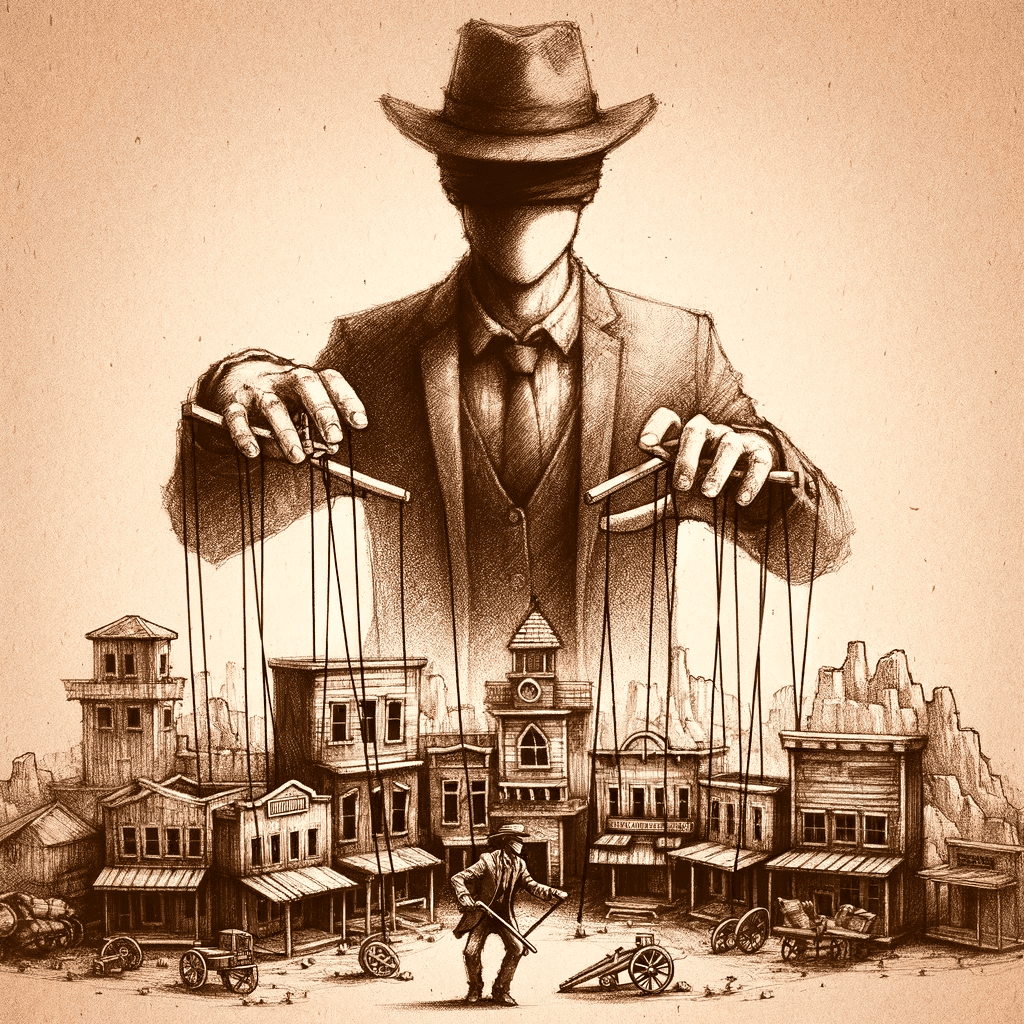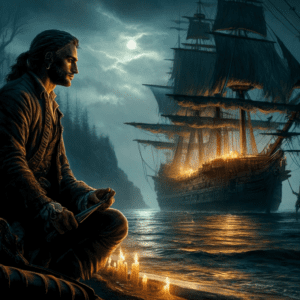
Jean-Luc Moreau’s gaze was an anchor, tethered to the turbulent sea where Mihai had vanished. The crew’s cries pierced the night, a cacophony of fear and disbelief, but Jean-Luc stood steadfast, a beacon of command despite the tempest within him.
Elena Ortiz, usually the embodiment of composure, was unraveling before his eyes. Her hands trembled as she clutched the ship’s rail, her face ashen, her hazel eyes wide with horror. “Mihai,” she whispered, the name a ghost on her lips.
Jean-Luc’s mind raced for solutions, his strategic prowess grappling with the grim reality of their situation. He turned to his crew, their faces reflecting the moonlight and their own dread. “Man the ropes!” he bellowed above the clamor. “Prepare to cast the nets!”
The crew sprang into action, moving with a haste born of desperation. Jean-Luc knew that tangling with a kraken was a fool’s errand, yet Mihai had risked it all for them—there was no question that they would attempt to do the same for him.
He scanned the waters, hoping for a sign—a ripple or disturbance—that might reveal Mihai’s location. The kraken was gone, retreated to the unfathomable depths, and with it any trace of their companion.
“Captain,” one of his men called out, voice strained with exertion as they worked to deploy the nets. “There’s nothing.”
Jean-Luc swallowed hard against the tightness in his throat. His orders had been given more out of necessity than any true hope of success; deep down he knew that once the kraken claimed its prize, it seldom returned it.
The Libertine creaked and groaned beneath them as she regained her pace, her sails billowing with newfound freedom. Yet there was no victory in this escape—only loss and a lingering question of what could have been done differently.
“Keep watch,” Jean-Luc instructed his first mate, though he could see in the man’s eyes that he too understood the futility. “Should there be any sign… any at all.”
Jean-Luc turned once more to Elena. She was still staring into the abyssal dark where Mihai had disappeared. He approached her slowly and placed a hand on her shoulder—a silent offer of solace in a moment bereft of words.
They stood together at the ship’s edge, looking out into the night, united in their helplessness against the vast and merciless ocean.

In the kraken’s unyielding grasp, Mihai plummeted through the crushing darkness, his mind a whirlpool of panic and disbelief. The pressure around him mounted, a vice squeezing against his chest. He thrashed within the kraken’s tentacles, their grip like iron chains laced with malice. Water rushed into his ears, a deafening roar that drowned out all else. His lungs burned for air, each second an eternity stretching out into oblivion.
Mihai’s eyes stung as he struggled to see through the murky void, his werewolf strength of little use against the enormity of his captor. Fear clawed at his insides—the stark realization that this might be where his story ended. The cold seeped into his bones, a reminder of mortality he had never truly considered until now.
The kraken dragged him deeper still, to where light had long since surrendered to darkness. Mihai could feel the creature’s intent—its desire to descend to its lair where no hope of escape could flourish. His heart hammered against his ribcage, each beat a drumroll in the symphony of his impending doom.
In these depths, where no man was meant to venture, Mihai’s resolve wavered. The ferocity that defined him seemed insignificant in the face of such overwhelming power. Yet even as hope flickered and dimmed like a drowning flame, something within him refused to succumb to resignation.
His life would not end in shadow and silence; not without defiance, not without a fight for every last breath. The beast within howled against the abyss—a primal challenge to the darkness that sought to claim him.
Mihai’s powerful legs kicked with wild desperation. His instincts screamed for survival, urging him to fight against the suffocating darkness that threatened to swallow him whole. The kraken, a leviathan of the deep, remained indifferent to his struggles, its many eyes glinting with a primordial hunger.
Each kick from Mihai was a burst of defiance against his watery tomb. His werewolf form afforded him strength beyond that of any man, but even this seemed paltry in the grip of such a monster. His claws, sharp as knives and strong as steel, thrashed in search of purchase on the kraken’s rubbery flesh.
Time and again, his efforts were met with failure. The pressure built around him—a silent, crushing force that sought to claim his very essence. With every attempt that slipped away into futility, the cold seeped deeper into his bones.
Then, in a moment woven from desperation and fury, one of Mihai’s claws found its mark. The serrated edge tore into the kraken’s sinewy hide with a violence born from primal terror. A rush of adrenaline surged through Mihai’s veins as he felt the creature recoil in surprise and pain.
Emboldened by this small victory, he struck again with renewed vigor. This time his claw lodged firmly into the beast’s flesh, tethering him to it not as prey but as an adversary worthy of its attention. The tentacle around him began to loosen—first gradually, then with a suddenness that allowed hope to seep back into Mihai’s drowning heart.
In the suffocating depths, the kraken, an ancient creature of the deep, perceived a shift in its conquest. Mihai’s fierce resistance, an unexpected challenge from what it deemed mere prey, stirred a sense of unease in its ancient consciousness. For eons, it had roamed the abyss unchallenged, its will imposed upon all it encountered. Yet here thrashed a being whose spirit matched the ferocity of the ocean’s darkest corners.
The kraken, with intellect that spanned centuries, weighed the cost of this encounter. Its body bore the marks of Mihai’s fury—a testament to the werewolf’s will to survive. The energy expended to maintain its hold on such a tenacious adversary was considerable. And for what? The kraken’s endless hunger could be sated elsewhere without such expenditure. This battle had become an anomaly in its timeless existence—an exertion without purpose.
With a decision that resonated through its massive form, the kraken relinquished its grasp. The release was sudden; Mihai felt the pressure around him dissipate as if the sea itself had exhaled. His body, driven by instinct and an unyielding desire to live, propelled itself towards the promise of air above.

Jean-Luc Moreau’s figure, an unwavering column against the Libertine’s stern, cast a long shadow over the deck as twilight surrendered to night. His deep blue eyes, mirrors of the sea he so revered, held within them a storm of resignation. The expanse before him stretched endlessly, a vast emptiness that seemed to swallow hope whole.
Below him, the deck was awash with passengers—faces strained and expectant—scouring the churning waters for any sign of Mihai. But Jean-Luc knew the sea’s secrets were not easily relinquished. He understood its depths and the creatures lurking beneath; a man—even one as formidable as Mihai—was but a mote in its infinite dominion.
He turned his gaze from the indifferent ocean to his people. Among them stood Elena, her slender frame rigid with shock. The ribbon that once restrained her cascading hair fluttered loose, much like the control she meticulously maintained. Her hands clasped before her, she was an emblem of loss personified.
Beside her, Rafael spoke in hushed tones, his words meant to console. But what solace could be found? Rafael’s gestures—a hand on her arm, an empathetic tilt of the head—spoke of a shared history and a bond beyond mere camaraderie. Yet even he could not mask the hollow note in his assurances.
The passengers’ search continued, their movements mechanical and fruitless. Whispers snaked through their ranks; some still clung to threads of hope while others accepted the grim reality with heavy hearts. Jean-Luc saw it all—their fears and silent admissions that one of their own was now beyond reach.
As captain, Jean-Luc felt each loss acutely, a weight added to the burden he carried since they embarked on this journey. Mihai’s absence was a gap in their woven tapestry; one less strand to fortify them against what lay ahead.
With a heavy sigh that went unheard amidst the sounds of sail and sea, Jean-Luc finally stepped away from his post at the ship’s edge. There were decisions to be made and a course to hold—a leader must face forward even when part of him lingered in the past.
From the crow’s nest, a shout cleaved the heavy silence that had settled over The Libertine. “Man overboard! Wolf, swimming astern!”
The call shattered the night’s gloom like a thunderclap. Every soul aboard turned seaward, their gazes latching onto the spot where the lookout wildly gesticulated. There, in the moon’s silvery path upon the water, was a figure—Mihai Lupu—his powerful limbs churning the sea into froth as he paddled with supernatural vigor.
A ripple of astonishment coursed through the passengers, electrifying the air with sudden hope. They clamored to the ship’s sides, their faces alight with excitement and disbelief.
Jean-Luc Moreau felt his heart surge within his chest—a captain’s spirit reignited by this unexpected turn of fate. His command was swift, ringing clear above the din of elated cries. “Lower the longboat! And fetch those chains—quickly now!”
The crew sprang into action, galvanized by their captain’s voice and the prospect of retrieving their comrade from Neptune’s grasp. The longboat hit the water with a resounding splash, and oars sliced through waves as sailors rowed towards Mihai’s struggling form.
Elena Ortiz leaned over the rail, her earlier despair washed away by a tide of relief. Her voice joined those cheering Mihai on, urging him to endure just a little longer.
Rafael Torres stood by her side, his earlier consolations now turned to fervent prayers under his breath.
Jean-Luc watched from The Libertine’s deck as Mihai drew closer, his werewolf form a dark, dog-paddling silhouette against the liquid silver sea. The longboat reached him, and strong hands grasped fur and flesh, hauling him aboard amidst cheers that echoed across the waters.
“Bring him home,” Jean-Luc whispered to himself as he turned away from the rail to prepare for Mihai’s return to The Libertine. His ship had regained what was lost; they were whole once more.

The Queen of the Witches, Bianca Luna Romano, draped in a cloak of midnight velvet, sat in silent contemplation within the confines of her ornate carriage. The vehicle traversed the undulating landscape toward the Château de Chambord, its path flanked by verdant fields. She gazed through the window, her eyes reflecting the verdure outside, yet seeing beyond it—to a future where her people would thrive under new guidance.
As the carriage wheels whispered over the cobblestones, Bianca Luna’s thoughts turned to the young king, Charles-Henri, a child born into a legacy as deep and complex as the roots of an ancient oak. She considered his parents, Armand and Marie-Elisabeth De Bourbon—two souls whose union had been a confluence of powerful lineages. Their home, the Château de Chambord, was a nexus of mystical energies, a fitting place for such a meeting.
The Queen knew well that this was no ordinary courtesy call. The gravity of her mission weighed upon her like the stones of her ancestral crown. She would meet the boy who bore the mark of the king.
The journey seemed an eternity and a mere moment all at once. As they approached their destination, Bianca Luna readied herself for what lay ahead. The carriage slowed to a halt before the grand edifice that was the château—a fortress and palace entwined as one. It stood as both sentinel and sanctuary against the creeping shadows of persecution.
Her heart was a drumbeat echoing through her chest as she descended from her carriage with regal grace. She adjusted her cloak, feeling its weight upon her shoulders—a weight mirrored by the responsibility she carried for all witchkind.
Bianca Luna took measured steps toward the grand entrance where Armand and Marie-Elisabeth awaited her arrival. Their expressions were painted with pride and apprehension—a mirror to her own emotions as they prepared to discuss matters of great import.
She greeted them with formal nods, masking any trepidation with practiced ease. “Armand, Marie-Elisabeth,” she began, her voice carrying both warmth and solemnity. “I come before you today not just as your queen but as one who shares your hopes for our future.”
The De Bourbons returned her greeting with equal formality and deference to her position. Together they walked through corridors steeped in history toward where Charles-Henri awaited them—their pace slow but determined, their conversation laced with anticipation for what was to come.
The nursery was a haven of tranquility, swathed in hues of azure and gold, a reflection of the sky at dawn. Charles-Henri, heir to a lineage steeped in mystique, lay cradled in a bassinet carved with sigils that whispered protection. Queen Bianca, entered the chamber with Armand and Marie-Elisabeth De Bourbon flanking her, their presence a bastion against the uncertainty that loomed beyond the château’s walls.
Marie-Elisabeth gestured to the servants attending the room with a subtle flick of her wrist. The command was clear, though softly given, and the servants bowed before making their exit. The room’s grandeur faded into the background as the royal trio centered their attention on the child destined to unite their fates.
Once alone, an air of solemnity settled over them. Bianca felt Armand and Marie-Elisabeth’s concern for her as tangible as the warmth from the hearth. They had not seen her since Wolfgang’s untimely departure from this realm—a departure that left an abyss in her heart where his love once resided.
Armand stepped forward, his voice low but rich with empathy. “Bee, we cannot fathom your sorrow. Wolfy was more than a king; he was a beacon for us all.”
Marie-Elisabeth’s gaze lingered on Bianca with an intensity born of shared loss. “We are here for you,” she affirmed.
Bianca felt the swell of emotions within her—a tempest calmed by their words of solace. She approached Charles-Henri’s side and peered down at him. His chest rose and fell with each breath, a rhythm that spoke of new beginnings amidst endings.
She brushed her hand lightly over his forehead where once danced that celestial light, feeling the thrum of potential that lay dormant within him. “This child,” she began, her voice steadied by resolve, “he is our hope now.”
Armand and Marie-Elisabeth exchanged glances—a silent conversation between two souls bound by love and duty—before turning back to face their queen.
Bianca Luna’s eyes held theirs in a moment of unspoken understanding before she continued. “We must guide him, shield him until he can rise to his destiny.” Her fingers lingered on Charles-Henri’s soft curls as she spoke.
Queen Bianca Luna Romano, her presence as commanding as the tide, regarded the sleeping form of Charles-Henri. The hush of the nursery could not silence the whispers of power that clung to her like a second skin. She had seen kingdoms rise and fall, had steered the course of witchdom through tempests both literal and figurative. Her resolve was a fortress, her will, the beacon guiding her people through darkness.
Turning to Armand and Marie-Elisabeth De Bourbon, she allowed the mask of queenly poise to soften into something more personal—a gesture that revealed her humanity amidst the mantle of authority she wore.
“I have come not only to meet our future king,” she began, her voice imbuing the air with purpose, “but to ensure his education in our ways. He will need to be a force unto himself, and I intend to guide him towards that end.”
Her words hung between them, a declaration wrapped in velvet steel. It was not a request but an affirmation of her role in Charles-Henri’s life—a role as vital as any crown or scepter.
Armand nodded slowly, his gaze shifting toward the window where movement caught his attention. A procession of carriages and figures clad in cloaks stood waiting—Bianca Luna’s entourage. A cadre of advisors, guardians, and scholars; each a master of their craft, handpicked by the Queen herself to aid in Charles-Henri’s upbringing.
Marie-Elisabeth moved closer to the window, her eyes widening at the sight. The entourage was vast—a living testament to Bianca Luna’s reach and resources. Their presence transformed the Château de Chambord from noble estate into a nexus for the old ways—a bastion for knowledge that had been hunted and hoarded for centuries.
Armand turned back to Bianca Luna with newfound appreciation coloring his features. “Your commitment is as clear as it is profound,” he acknowledged. “We are honored by your dedication.”
The Queen inclined her head graciously, yet behind her eyes lay a depth of foresight born from years at witchdom’s helm. “It is my duty,” she replied simply. “And my privilege.”
In the stillness that followed, three pairs of eyes settled on Charles-Henri once more—the child whose destiny was interwoven with their own. In him lay their legacy; in him burned the flame that would endure beyond their years.






